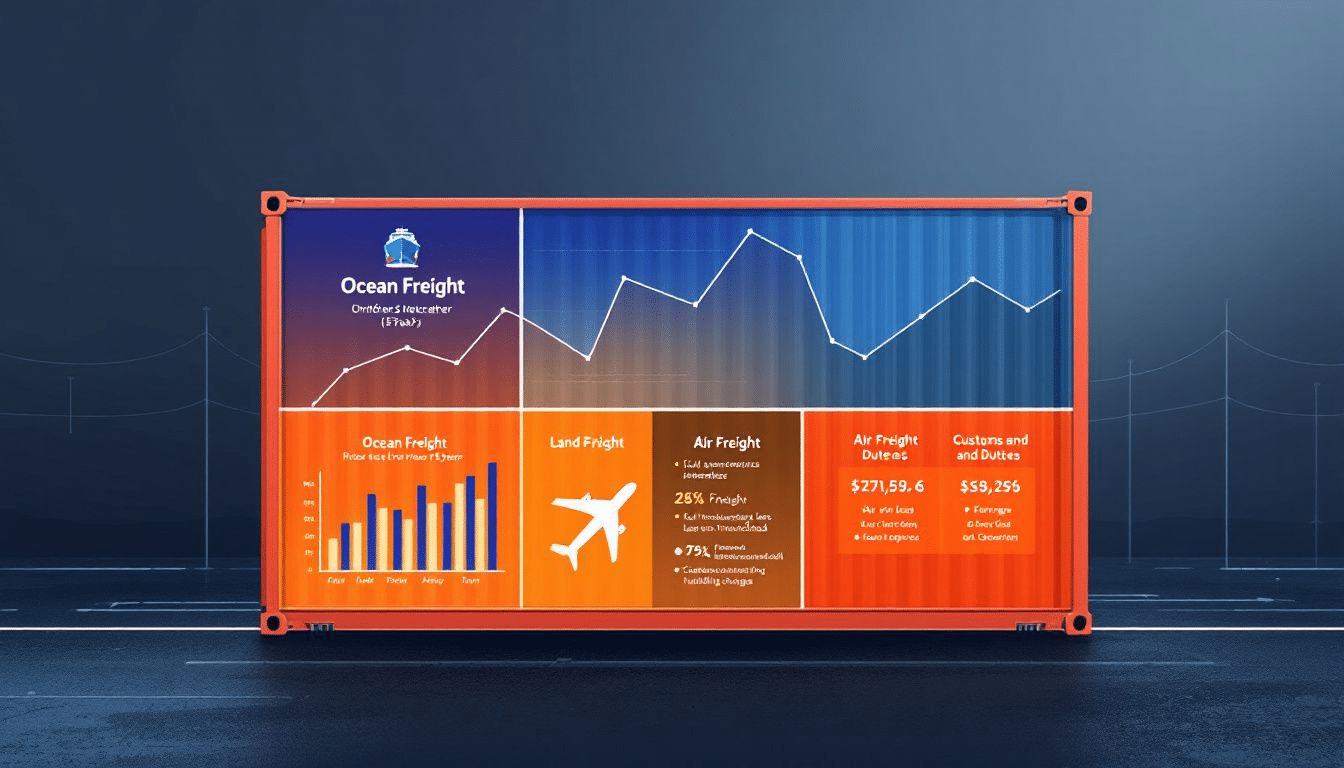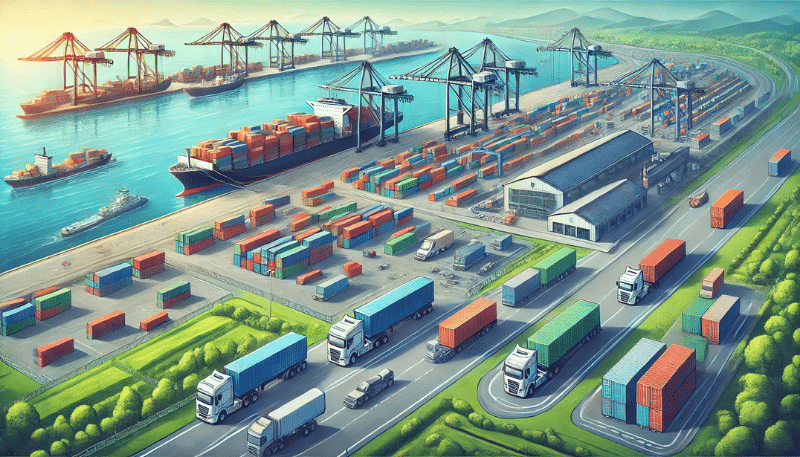Freight fees are the costs of transporting goods between different locations. These fees depend on factors like the carrier, distance, mode, and package dimensions, which can lead to major price differences between shipments.
Freight fees significantly impact your shipping expenses and supply chain efficiency, so it’s important to understand the fees your shipments may incur. That way, you can ensure you’re not overpaying and take steps to reduce your overall freight shipping costs.
In this piece, we’ll highlight some of the most common fees and offer tips on reducing them.
Key Takeaways
-
Freight fees encompass various charges related to transporting goods, significantly impacting shipping costs and supply chain efficiency.
-
Key factors influencing freight fees include shipment weight, distance, mode of transportation, and additional fees like customs clearance and terminal handling.
-
Businesses can reduce freight shipping costs through strategies such as optimizing packaging, negotiating with carriers, and leveraging freight forwarders for better rates and efficiency.
What Are Freight Fees?

Freight fees are the costs associated with transporting goods from one location to another. They encompass a range of charges, from the basic cost of moving goods to additional fees for special handling, customs clearance, and more.
Each carrier may have its own freight rates and fees for various services, which often depend on the terms of your carrier contract. In many cases, you’ll receive a freight quote that outlines these costs based on your shipment information, making accurate details important for estimating and budgeting freight costs.
After the carrier completes your shipment, they’ll include any freight fees and your total costs in a freight bill. You can then complete a freight audit to verify these fees and contest any overcharges.
Common Freight Fees You Should Know
Freight fees encompass a wide range of conditions and factors. Some may appear in most or all freight bills you receive, while others only apply to out-of-the-way or complex shipments.
Regardless of your industry, volume, or location, you should be aware of all of these common fees so you can budget appropriately and reduce unnecessary spending.
Common freight fees include:
-
Fuel Surcharge: An adjustable fee added to account for fluctuating fuel costs, typically calculated as a percentage of the base freight rate
-
Booking Fees: For reserving space with carriers, ensuring your shipment is secured on the desired vessel or vehicle
-
Handling Charges: Covering the processing, loading, and unloading of goods at warehouses or terminals
-
Documentation Fees: For preparing, managing, and submitting necessary shipping documents like bills of lading and customs paperwork
-
Accessorial Charges: Extra fees for services like liftgate delivery, inside pickup, or residential delivery beyond standard shipping
-
Customs Clearance Fees: Charges for processing and clearing goods through customs, including duties, taxes, and brokerage fees
-
Weight or Dimension Adjustment Fees: Costs incurred when the actual weight or dimensions of a shipment differ from the declared values
-
Demurrage Fees: Charges for exceeding the allowed free time at a terminal or port before pickup or delivery
-
Detention Fees: Applied when a truck or container is delayed beyond the allowed time for loading or unloading
There are also some fees that only apply in certain circumstances or for high-risk shipments and deliveries.
Specialty or situational freight fees include:
-
Peak Season Surcharge: Additional costs during high-demand periods, like holidays or peak shipping seasons
-
Hazmat Fees: Special charges for handling hazardous materials that require additional care and compliance measures
-
Port Congestion Fees: Imposed when ports experience delays or congestion, compensating carriers for increased turnaround times
-
Re-consignment Fees: Applied for rerouting or changing the delivery address after the shipment is in transit
-
Out-of-Delivery-Area Fees: Extra charges for shipments destined for remote or hard-to-reach locations
Fortunately, you can forecast some of these fees based on the shipment contents, time of year, or destination.
What Factors Affect Freight Fees?
Freight fees and shipping costs can significantly vary from shipment to shipment. If you want to accurately forecast your freight costs, you’ll need to consider package details, how the package will travel to the recipient, and where the destination is.
Here are some specific factors that are essential for determining freight rates and fees.
-
Freight Weight and Dimensions: A shipment’s weight and dimensions affect its size, the amount of space it takes up, the amount of gas it takes to transport it, and whether it needs additional handling. These factors determine your overall shipping costs, including freight rates and added fees.
-
Shipping Distance: The distance a shipment travels impacts its freight costs due to increased fuel consumption, labor costs of loading or unloading at stops, and other operational expenses required to get the shipment from point A to point B.
-
Mode of Transportation: Your chosen shipping method determines both your costs and efficiency. Air shipping, for example, is generally more expensive due to planes having a lower capacity and increased fuel costs, but offers faster delivery times for urgent shipments. Alternatively, ocean shipping is cheaper thanks to larger cargo ship capacities but also slower, making it ideal for bulky or heavy goods that are not time-sensitive.
-
Logistics Network Congestion: Carriers’ logistics networks can only handle so many packages, so rates and added fees can increase during peak times like the holiday season.
These factors determine the majority of your overall shipping costs, but there are plenty of other freight fees to know.
How to Reduce Freight Costs
While added fees can significantly increase your freight shipping costs, you can reduce their impact with strategic planning and effective cost management.
Here’s how.
Optimizing Packaging
Optimizing packaging can significantly lower shipping costs by reducing the weight and volume of shipments. Using lighter materials and efficient packaging practices not only minimizes the overall weight but also reduces the space occupied by the cargo, leading to lower freight rates.
Negotiating with Carriers
Building strong relationships with carriers can lead to better freight rates over time. Effective carrier contract negotiation involves comparing rates from multiple carriers, leveraging shipping volume, and increasing lead times to help carriers manage resources efficiently.
Planning Shipments Strategically
Strategic planning in shipment scheduling is crucial for cost control. By planning shipments around peak logistics periods, you can avoid peak season surcharges and reduce overall freight costs. You should also consider consolidating shipments when possible and using cost-effective shipping modes when your delivery schedule allows for them.
Working with A Freight Forwarder
Freight forwarders help manage, streamline, and optimize your logistics process to lower costs and improve efficiency. They handle transportation arrangements, customs clearance, documentation, warehousing, and cargo insurance, ensuring your shipments move smoothly across borders and through supply chains. They can leverage transaction volumes to negotiate better freight rates, offering significant cost savings across shipments.
In many cases, a freight forwarder will use a transportation spend management system to help further optimize your shipping.
Using a Transportation Spend Management System
Implementing a transportation spend management system (TSMS) like FreightOptics helps you reduce overall shipping costs, including freight fees. These systems help you track and analyze your shipping costs, including automated freight and parcel audits that ensure you don’t pay unnecessary fees or get overcharged. They can also uncover route optimizations and help you optimize your packaging to save even more or identify periods of high volume to plan shipments around.
At Zero Down, we’ve used FreightOptics to save our clients millions by finding the billing errors and refund opportunities other auditors miss.
For example, we helped a leading distributor of electronic and electro-mechanical equipment save over $100k annually by auditing their highly complex Air/Ocean invoices. After comparing their carrier contract rates to their actual costs, our audit uncovered numerous overcharges that the previous auditors failed to find, resulting in major savings. Our business intelligence tools also helped identify and fix the errors to avoid future overcharges.
Learn How to Manage Freight Fees for Cost-Effective Shipping
Freight fees play a major role in your final transportation costs. By understanding the various fees that may apply and accounting for them, you can better manage your freight spending.
You can expect to see common fees like fuel surcharges, accessorial charges, and customs fees in most complex or international deliveries, but others, like hazardous material fees, only apply to specific industries and situations.
If you want to lower your freight costs, consider working with a supply chain solution provider like Zero Down, which can provide you with a transportation spend management system that helps optimize your shipments, packaging, routes, and carrier contracts. We’ll also use freight audits to make sure you’re only paying what you owe.
Now that you know some common freight fees and what they mean, you can forecast your costs and take steps to reduce them by negotiating lower fees or removing them from your logistics needs.
Reach out to Zero Down to learn more about cost-effective shipping solutions for your business.
Frequently Asked Questions
What are freight fees, and why are they important?
Freight fees are essential costs for transporting goods that significantly affect a business’s shipping expenses and supply chain efficiency.
How can I reduce my freight fees?
To effectively reduce your freight fees, optimize your packaging, negotiate with carriers, and plan shipments strategically.
What are some common additional freight fees I should be aware of?
Be aware of common additional freight fees such as terminal handling charges, customs clearance fees, and demurrage and detention charges.
How do freight forwarders help in managing shipping costs?
Freight forwarders effectively manage transportation costs by negotiating favorable rates with carriers and streamlining logistics services, which enhances efficiency and compliance with regulations.
What factors affect freight fees the most?
Freight fees are primarily influenced by the weight and dimensions of the shipment, the distance traveled, and the mode of transportation. Additionally, market conditions and fluctuating fuel costs play significant roles in determining these fees.
Brad McBride, CEO and Founder of Zero Down Supply Chain Solutions is a dynamic leader with over 30 years of experience in the supply chain sector. His journey began at Consolidated Freightways in 1988, where he mastered freight logistics and pricing. His career led him to Eagle Global Logistics, diving into international freight forwarding and leading high-volume shipping projects.
Read More



